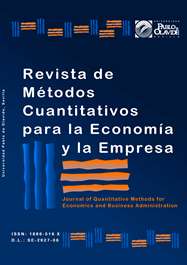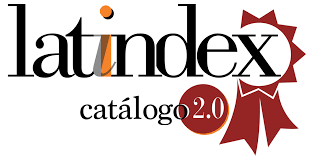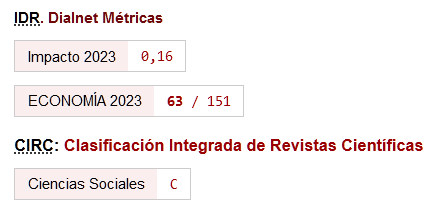Designing a hotel ranking mobility index
DOI:
https://doi.org/10.46661/revmetodoscuanteconempresa.3060Keywords:
TripAdvisor, ranking, hotels, mobility, data miningAbstract
Hotel rankings exert great influence on tourists when choosing a hotel. The hoteliers also strive to appear at the top of the ranking. However, the evolution over time of these rankings has been little studied, so it is necessary due to the important implications for entrepreneurs to deepen the analysis to answer questions like this: Do the hotels stay in the same (or quite similar) positions or do they experience big changes in the classification? This work tries to provide new tools for the analysis of these rankings with the creation of an index that measures the mobility of a hotel in the ranking. The model will be applied to a sample of 727 hotels with data extracted from Tripadvisor in five Spanish cities (Barcelona, Madrid, Seville, Valencia and Zaragoza).
Downloads
References
Ayeh, J. K., Au, N., & Law, R. (2013). “Do we believe in TripAdvisor?” Examining credibility perceptions and online travelers’ attitude toward using user-generated content. Journal of Travel Research, 52(4), 437-452.
Biffaro, L. (2015). Unfair Commercial Practices and Online Consumer Reviews: the Italian Tripadvisor Case. Rivista Italiana di Antitrust/Italian Antitrust Review, 2(1), 181-185.
Box, G.E.P., Jenkins, G.M., Reinsel, G.C., & Ljung, G.M. (2015). Time Series Analysis: Forecasting and Control, 5th Ed. New York: Wiley.
Budria, S. (2010). Schooling and the distribution of wages in the European private and public sectors. Applied Economics, 42(8), 1045-1054.
Callarisa-Fiol, L.J., Sánchez-García, J., Moliner, M.Á., & Forgas-Coll, S. (2012). La importancia de las comunidades virtuales para el análisis del valor de marca. El caso de Tripadvisor en Hong Kong y París. Papers de turisme, 54, 89-115.
Chen, Y.F., & Law, R. (2016). A Review of Research on Electronic Word-of-Mouth in Hospitality and Tourism Management. International Journal of Hospitality & Tourism Administration, 17(4), 347-372.
Deeg, D.J. (2002). Attrition in longitudinal population studies: Does it affect the generalizability of the findings? Journal of Clinical Epidemiology, 55(3), 213-215.
Durán, P. (2005). Los datos perdidos en estudios de investigación ¿son realmente datos perdidos? Archivos argentinos de pediatría, 103(6), 566-568.
Eco, U. (2011). El vértigo de las listas. IC Revista Científica de Información y Comunicación, 8, 15-34.
Engels, J. M., & Diehr, P. (2003). Imputation of missing longitudinal data: a comparison of methods. Journal of Clinical Epidemiology, 56(10), 968-976.
EC-European Commission (2014). Study on Online Consumer Reviews in the Hotel Sector. Final report. Recuperado de: http://bookshop.europa.eu/en/study-on-online-consumer-reviews-in-the-hotel-sector-pbND0414464/
Filieri, R., Alguezaui, S., & McLeay, F. (2015). Why do travelers trust TripAdvisor? Antecedents of trust towards consumer-generated media and its influence on recommendation adoption and word of mouth. Tourism Management, 51, 174-185.
Ghose, A., Ipeirotis, P.G., & Li, B. (2012). Designing Ranking Systems for Hotels on Travel Search Engines by Mining User-Generated and Crowdsourced Content. Marketing Science, 31(3), 493–520.
González, S.M., Gidumal, J.B., & López-Valcárcel, B.G. (2010). La participación de los clientes en sitios web de valoración de servicios turísticos. El caso de Tripadvisor. Revista de Análisis Turístico, 10, 17-22.
Hensens, W. (2010). The reliability of data from guest reviews on Tripadvisor as a contemporary social media platform. Paper submitted and presented at SAIMS 2010 in Mpekweni Resort.
Instituto Nacional de Estadística (2015). Cifras oficiales de población de los municipios españoles: Revisión del Padrón Municipal. Madrid: Ministerio de Economía y Empresa. Recuperado de: https://www.ine.es/dyngs/INEbase/es/categoria.htm?c=Estadistica_P&cid=1254734710990
Jeacle, I., & Carter, C. (2011). In TripAdvisor we trust: Rankings, calculative regimes and abstract systems. Accounting, Organizations and Society, 36(4), 293-309.
Jenkins, S.P., Brandolini, A., Micklewright, J. Nolan, B., & Basso, G. (2012). The Great Recession and its consequences for household incomes in 21 countries. En Jenkins, S.P., Brandolini, A., Micklewright, J., & Nolan, B. (eds.). The Great Recession and the Distribution of Household Income. Oxford: Oxford University Press, pp.33-89.
Jurca, R., Garcin, F., Talwar, A., & Faltings, B. (2010). Reporting incentives and biases in online review forums. ACM Transactions on the Web, 4(2), 1-27.
Kladou, S., & Mavragani, E. (2015). Assessing destination image: An online marketing approach and the case of TripAdvisor. Journal of Destination Marketing & Management, 4(3), 187-193.
Kirchgässner, G., Wolters, J., & Hassler, U. (2013) Introduction to Modern Time Series Analysis. Berlin: Springer-Verlag.
Kwok, L., Xie, K. L., & Richards, T. (2017). Thematic framework of online review research: A systematic analysis of contemporary literature on seven major hospitality and tourism journals. International Journal of Contemporary Hospitality Management, 29(1), 307-354.
Lee, H. A., Law, R., & Murphy, J. (2011). Helpful reviewers in TripAdvisor, an online travel community. Journal of Travel & Tourism Marketing, 28(7), 675-688.
Mateos, J. C., Martín, M.A.R., & Martín-Velicia, F. A. (2014). Disrupción en el uso de la web 2.0 en los hoteles independientes. Cultura, desarrollo y nuevas tecnologías: VII Jornadas de investigación en turismo, 169-183.
Melián, S., Bulchand, J., & González, B. (2010). La participación de los clientes en sitios web de valoración de servicios turístico. El caso de TripAdvisor. Análisis Turístico, 10, 17-22.
Mellinas, J. P., Martínez, S.M., & Bernal, J.J. (2015). Booking.com: The unexpected scoring system. Tourism Management, 49, 72-74.
Miguéns, J., Baggio, R., & Costa, C. (2008). Social media and tourism destinations: TripAdvisor case study. Advances in Tourism Research, 26(28), 1-6.
Milanovic, B. (2015), Global Inequality of Opportunity: How Much of Our Income Is Determined by Where We Live? The Review of Economics and Statistics, 97(2), 452-460.
Mills, T.C. (2011). The foundations of modern time series analysis. Basingstoke, U.K.: Palgrave, McMillan.
Molinillo, S., Ximénez-de-Sandoval, J. L., Fernández-Morales, A., & Coca-Stefaniak, A. (2016). Hotel assessment through social media: the case of TripAdvisor. Tourism & Management Studies, 12(1), 15-24.
O’Connor, P. (2008). User-generated content and travel: A case study on Tripadvisor.com. In: O’Connor P., Höpken W., Gretzel U. (eds), Information and Communication Technologies in Tourism 2008. Springer, Vienna.
O'Connor, P. (2010). Managing a hotel's image on TripAdvisor. Journal of Hospitality Marketing & Management, 19(7), 754-772.
O’Mahony, M.P., & Smyth, B. (2009). Learning to recommend helpful hotel reviews. Proceedings of the third ACM conference on Recommender systems - RecSys ’09, 305.
Ong, B. S. (2012). The Perceived Influence of User Reviews in the Hospitality Industry. Journal of Hospitality Marketing & Management, 21(5), 463-485.
Ott, M., Cardie, C., & Hancock, J. (2012). Estimating the Prevalence of Deception in Online Review Communities. Proceedings of the 21st international conference on World Wide Web WWW 12, 201-210.
Río, C., Gradín, C., & Cantó, O. (2011). The Measurement of Gender Wage Discrimination: The Distributional Approach Revisited. The Journal of Economic Inequality, 9(1), 57-86.
Scott, S.V, & Orlikowski, W. J. (2012). Reconfiguring relations of accountability: Materialization of social media in the travel sector. Accounting, Organizations and Society, 37(1), 26-40.
Smyth, P.C.B., Wu, G., & Greene, D. (2010). Does TripAdvisor makes hotels better? Derek Greene School of Computer Science & Informatics, University College Dublin Belfield.
Sotiriadis, M.D. (2017). Sharing tourism experiences in social media: A literature review and a set of suggested business strategies. International Journal of Contemporary Hospitality Management, 29(1), 179-225.
TripAdvisor (2016).Changes to the Tripadvisor Popularity Ranking Algorithm. Recuperado de: https:// www.tripadvisor.com/TripAdvisorInsights/n2701/ changes-tripadvisor- popularity-ranking-algorithm
Tuominen, P. (2011). The influence of TripAdvisor consumer-generated travel reviews on hotel performance. University of Hertfordshire Business School Working Paper.
Twisk, J., & De Vente, W. (2002). Attrition in longitudinal studies: how to deal with missing data. Journal of Clinical Epidemiology, 55(4), 329-337.
Vásquez, C. (2011). Complaints online: The case of TripAdvisor. Journal of Pragmatics, 43(6), 1707-1717.
Xiang, Z., & Gretzel, U. (2010). Role of social media in online travel information search. Tourism Management, 31(2), 179-188.
Downloads
Published
How to Cite
Issue
Section
License
Copyright (c) 2019 Journal of Quantitative Methods for Economics and Business Administration

This work is licensed under a Creative Commons Attribution-ShareAlike 4.0 International License.
Submission of manuscripts implies that the work described has not been published before (except in the form of an abstract or as part of thesis), that it is not under consideration for publication elsewhere and that, in case of acceptance, the authors agree to automatic transfer of the copyright to the Journal for its publication and dissemination. Authors retain the authors' right to use and share the article according to a personal or instutional use or scholarly sharing purposes; in addition, they retain patent, trademark and other intellectual property rights (including research data).
All the articles are published in the Journal under the Creative Commons license CC-BY-SA (Attribution-ShareAlike). It is allowed a commercial use of the work (always including the author attribution) and other derivative works, which must be released under the same license as the original work.
Up to Volume 21, this Journal has been licensing the articles under the Creative Commons license CC-BY-SA 3.0 ES. Starting from Volume 22, the Creative Commons license CC-BY-SA 4.0 is used.










